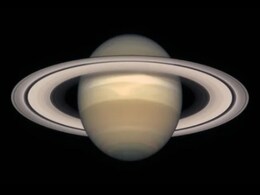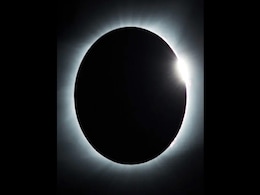Astronomy Night
- All
- News
- Web Stories
-

Vernal Equinox 2025: Date, Time, and the Science Behind the Event
- Friday March 7, 2025
- Written by Gadgets 360 Staff
The vernal equinox 2025 is set for March 20 at 09:01 UTC, marking the astronomical start of spring in the Northern Hemisphere and autumn in the Southern Hemisphere. This event occurs due to Earth’s axial tilt aligning with its orbit, resulting in nearly equal hours of daylight and night across the globe. While the equinox does not bring perfectly...
-
 www.gadgets360.com
www.gadgets360.com
-

T Coronae Borealis Nova Event: When and Where to See the 'Blaze Star'
- Wednesday March 5, 2025
- Written by Gadgets 360 Staff
T Coronae Borealis, also known as the 'Blaze Star,' is predicted to undergo a rare nova event, briefly making it visible to the naked eye. This recurrent nova, last seen erupting in 1946, is expected to brighten anytime between now and late 2024. Positioned in the constellation Corona Borealis, the star will be best visible a few hours after sunset...
-
 www.gadgets360.com
www.gadgets360.com
-

February 2025 Planet Parade: How to See Five Planets Align in the Sky
- Wednesday February 5, 2025
- Written by Gadgets 360 Staff
A rare celestial event will unfold in February 2025, with five bright planets—Venus, Jupiter, Mars, Mercury, and Saturn—visible in the evening sky. The highlight occurs on February 24, when Mercury and Saturn appear closest. Uranus and Neptune can also be observed with telescopes. Best viewing conditions require a clear west-southwest horizon a...
-
 www.gadgets360.com
www.gadgets360.com
-

Geminid Meteor Shower 2024 to Peak on December, But Moonlight May Affect Visibility
- Monday December 9, 2024
- Written by Gadgets 360 Staff
The Geminid meteor shower, renowned for its vibrant meteors, will peak overnight on December 13-14. However, a full moon on December 15 is expected to obscure much of the shower's activity, reducing visibility significantly. Limited dark sky windows are available in some regions before the peak, offering brief opportunities to observe this celestia...
-
 www.gadgets360.com
www.gadgets360.com
-

T Coronae Borealis' Nova Outburst May Happen Soon, Experts Suggest
- Tuesday December 3, 2024
- Written by Gadgets 360 Staff
Astronomers are closely monitoring T Coronae Borealis, a binary star system in the Corona Borealis constellation, for its next nova eruption. The event, expected within months, could light up the night sky as the white dwarf gathers material from its red giant companion, triggering a nuclear explosion. Advanced telescopes like NASA’s Fermi are ga...
-
 www.gadgets360.com
www.gadgets360.com
-

North Taurid Meteor Shower Peaks, Bringing Fireballs to US Night Skies
- Wednesday November 13, 2024
- Written by Gadgets 360 Staff
The North Taurid meteor shower, peaking November 11, offered skywatchers in the US a view of rare bright fireballs across the sky. Part of the Taurid meteor system, these meteors are known for their intensity and visibility, even under strong moonlight. Though fewer meteors occur in these showers, their brightness will make for a striking display o...
-
 www.gadgets360.com
www.gadgets360.com
-

November Night Sky 2024: Check Out the Brightest Planets and How to Watch Them?
- Monday November 4, 2024
- Written by Gadgets 360 Staff
November's night sky features a spectacular lineup of planets, including Venus, which becomes increasingly prominent in the west. Mars glows brightly as it approaches Earth, while Jupiter rises in the east, captivating observers with its brilliance. Saturn, with its magnificent rings, is also visible high in the southern sky. This month presents id...
-
 www.gadgets360.com
www.gadgets360.com
-

Euclid Space Telescope Unveils First Images of Its Cosmic Atlas
- Thursday October 17, 2024
- Written by Gadgets 360 Staff
The first stunning images from the European Space Agency's Euclid telescope reveal a mosaic of over 14 million galaxies, marking just 1% of its cosmic atlas. Captured over two weeks, this vast collection aims to enhance our understanding of dark matter and dark energy, contributing to the largest and most accurate map of the universe yet. The teles...
-
 www.gadgets360.com
www.gadgets360.com
-

Draconid Meteor Shower 2024: How to Watch Dozens of Shooting Stars in Night Sky
- Monday October 7, 2024
- Written by Gadgets 360 Staff
The Draconid Meteor Shower will peak on October 8 and 9, offering a chance to spot meteors shooting across the night sky. Named after the constellation Draco, the shower is known for its variable meteor count, with skywatchers able to see up to 10 meteors per hour. The radiant point of the shower lies in the northern sky, and unlike other meteor sh...
-
 www.gadgets360.com
www.gadgets360.com
-

Saturn to Enter Opposition Soon: What It Means and How to Watch the Rare Astronomical Event
- Wednesday September 4, 2024
- Written by Gadgets 360 Staff
Saturn will reach opposition on the night of September 7 and 8, marking a key astronomical event. During the event, Earth is positioned directly between Saturn and the Sun. This alignment allows Saturn to appear at its largest and brightest in the night sky. For those keen to observe Saturn in all its splendour, this is the ideal time as Saturn wil...
-
 www.gadgets360.com
www.gadgets360.com
-

Super Blue Moon of August 2024: Know All About This Rare Event
- Tuesday August 20, 2024
- Written by Gadgets 360 Staff
Super Blue Moon, a rare astronomical event, occurred on August 19. The much anticipated event was seen in the night sky after almost a year, as the previous Blue Moon was seen on August 30, 2023. But what exactly does that mean? Despite the exciting name, the Moon is not blue, and the change in its size is usually subtle.
-
 www.gadgets360.com
www.gadgets360.com
-

Look Up! A Once-In-A-Lifetime Explosion Is About To Create A 'New' Star In The Sky
- Wednesday July 10, 2024
- Science | The Conversation
Any night now, a "new star" or nova will appear in the night sky. While it wont set the sky ablaze, its a special opportunity to see a rare event thats usually difficult to predict in advance.
-
 www.ndtv.com
www.ndtv.com
-

Solar Eclipse To Rising Saturn: How To Catch Rare Celestial Events In April
- Thursday April 4, 2024
- Science | Edited by NDTV News Desk
As April unfolds, sky watchers and astronomy enthusiasts are in for a treat with a lineup of celestial events set to grace the night sky.
-
 www.ndtv.com
www.ndtv.com
-

Vernal Equinox 2025: Date, Time, and the Science Behind the Event
- Friday March 7, 2025
- Written by Gadgets 360 Staff
The vernal equinox 2025 is set for March 20 at 09:01 UTC, marking the astronomical start of spring in the Northern Hemisphere and autumn in the Southern Hemisphere. This event occurs due to Earth’s axial tilt aligning with its orbit, resulting in nearly equal hours of daylight and night across the globe. While the equinox does not bring perfectly...
-
 www.gadgets360.com
www.gadgets360.com
-

T Coronae Borealis Nova Event: When and Where to See the 'Blaze Star'
- Wednesday March 5, 2025
- Written by Gadgets 360 Staff
T Coronae Borealis, also known as the 'Blaze Star,' is predicted to undergo a rare nova event, briefly making it visible to the naked eye. This recurrent nova, last seen erupting in 1946, is expected to brighten anytime between now and late 2024. Positioned in the constellation Corona Borealis, the star will be best visible a few hours after sunset...
-
 www.gadgets360.com
www.gadgets360.com
-

February 2025 Planet Parade: How to See Five Planets Align in the Sky
- Wednesday February 5, 2025
- Written by Gadgets 360 Staff
A rare celestial event will unfold in February 2025, with five bright planets—Venus, Jupiter, Mars, Mercury, and Saturn—visible in the evening sky. The highlight occurs on February 24, when Mercury and Saturn appear closest. Uranus and Neptune can also be observed with telescopes. Best viewing conditions require a clear west-southwest horizon a...
-
 www.gadgets360.com
www.gadgets360.com
-

Geminid Meteor Shower 2024 to Peak on December, But Moonlight May Affect Visibility
- Monday December 9, 2024
- Written by Gadgets 360 Staff
The Geminid meteor shower, renowned for its vibrant meteors, will peak overnight on December 13-14. However, a full moon on December 15 is expected to obscure much of the shower's activity, reducing visibility significantly. Limited dark sky windows are available in some regions before the peak, offering brief opportunities to observe this celestia...
-
 www.gadgets360.com
www.gadgets360.com
-

T Coronae Borealis' Nova Outburst May Happen Soon, Experts Suggest
- Tuesday December 3, 2024
- Written by Gadgets 360 Staff
Astronomers are closely monitoring T Coronae Borealis, a binary star system in the Corona Borealis constellation, for its next nova eruption. The event, expected within months, could light up the night sky as the white dwarf gathers material from its red giant companion, triggering a nuclear explosion. Advanced telescopes like NASA’s Fermi are ga...
-
 www.gadgets360.com
www.gadgets360.com
-

North Taurid Meteor Shower Peaks, Bringing Fireballs to US Night Skies
- Wednesday November 13, 2024
- Written by Gadgets 360 Staff
The North Taurid meteor shower, peaking November 11, offered skywatchers in the US a view of rare bright fireballs across the sky. Part of the Taurid meteor system, these meteors are known for their intensity and visibility, even under strong moonlight. Though fewer meteors occur in these showers, their brightness will make for a striking display o...
-
 www.gadgets360.com
www.gadgets360.com
-

November Night Sky 2024: Check Out the Brightest Planets and How to Watch Them?
- Monday November 4, 2024
- Written by Gadgets 360 Staff
November's night sky features a spectacular lineup of planets, including Venus, which becomes increasingly prominent in the west. Mars glows brightly as it approaches Earth, while Jupiter rises in the east, captivating observers with its brilliance. Saturn, with its magnificent rings, is also visible high in the southern sky. This month presents id...
-
 www.gadgets360.com
www.gadgets360.com
-

Euclid Space Telescope Unveils First Images of Its Cosmic Atlas
- Thursday October 17, 2024
- Written by Gadgets 360 Staff
The first stunning images from the European Space Agency's Euclid telescope reveal a mosaic of over 14 million galaxies, marking just 1% of its cosmic atlas. Captured over two weeks, this vast collection aims to enhance our understanding of dark matter and dark energy, contributing to the largest and most accurate map of the universe yet. The teles...
-
 www.gadgets360.com
www.gadgets360.com
-

Draconid Meteor Shower 2024: How to Watch Dozens of Shooting Stars in Night Sky
- Monday October 7, 2024
- Written by Gadgets 360 Staff
The Draconid Meteor Shower will peak on October 8 and 9, offering a chance to spot meteors shooting across the night sky. Named after the constellation Draco, the shower is known for its variable meteor count, with skywatchers able to see up to 10 meteors per hour. The radiant point of the shower lies in the northern sky, and unlike other meteor sh...
-
 www.gadgets360.com
www.gadgets360.com
-

Saturn to Enter Opposition Soon: What It Means and How to Watch the Rare Astronomical Event
- Wednesday September 4, 2024
- Written by Gadgets 360 Staff
Saturn will reach opposition on the night of September 7 and 8, marking a key astronomical event. During the event, Earth is positioned directly between Saturn and the Sun. This alignment allows Saturn to appear at its largest and brightest in the night sky. For those keen to observe Saturn in all its splendour, this is the ideal time as Saturn wil...
-
 www.gadgets360.com
www.gadgets360.com
-

Super Blue Moon of August 2024: Know All About This Rare Event
- Tuesday August 20, 2024
- Written by Gadgets 360 Staff
Super Blue Moon, a rare astronomical event, occurred on August 19. The much anticipated event was seen in the night sky after almost a year, as the previous Blue Moon was seen on August 30, 2023. But what exactly does that mean? Despite the exciting name, the Moon is not blue, and the change in its size is usually subtle.
-
 www.gadgets360.com
www.gadgets360.com
-

Look Up! A Once-In-A-Lifetime Explosion Is About To Create A 'New' Star In The Sky
- Wednesday July 10, 2024
- Science | The Conversation
Any night now, a "new star" or nova will appear in the night sky. While it wont set the sky ablaze, its a special opportunity to see a rare event thats usually difficult to predict in advance.
-
 www.ndtv.com
www.ndtv.com
-

Solar Eclipse To Rising Saturn: How To Catch Rare Celestial Events In April
- Thursday April 4, 2024
- Science | Edited by NDTV News Desk
As April unfolds, sky watchers and astronomy enthusiasts are in for a treat with a lineup of celestial events set to grace the night sky.
-
 www.ndtv.com
www.ndtv.com

















